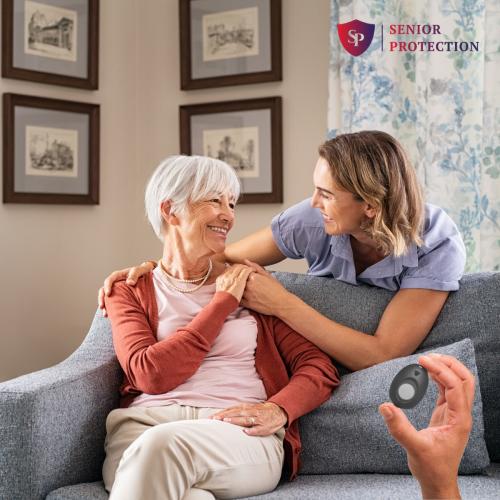Safe & Sound: Ensuring Seniors Thrive in Independent Living

As we age, ensuring the safety and well-being of seniors becomes a top priority. Many seniors prefer to live independently in their own homes, and with the right precautions and support, this is possible while maintaining a high standard of safety.

In this blog post, we’ll explore essential tips and strategies to help seniors live safely and confidently in their homes as they age.
Home Safety Evaluation: Conduct a thorough home safety evaluation to identify potential hazards. Check for loose carpets, slippery floors, and cluttered pathways that could lead to trips and falls. Install handrails, grab bars, and adequate lighting in hallways and staircases to reduce the risk of accidents.
Kitchen Safety: The kitchen can be a hazardous area for seniors. Ensure that appliances and utensils are easily accessible. Store commonly used items at waist level to avoid the need for reaching or climbing. Consider investing in a stove with automatic shut-off features and easy-to-read controls.
Bathroom Safety: The bathroom is another critical area for senior safety. Install non-slip mats in the shower or bathtub and consider a walk-in shower for added convenience. Place a sturdy chair or bench in the shower for seniors who may need to sit while bathing. Install a raised toilet seat with grab bars to reduce the risk of falls.
Medication Management: Proper medication management is crucial for seniors. Organize medications in pill organizers labeled with the day and time to be taken. Consider using a medication management app or setting reminders on their phones. Regularly review medications with a healthcare professional to avoid potential interactions or side effects.
Regular Exercise and Mobility: Encourage seniors to engage in regular exercise to maintain strength, balance, and flexibility. Low-impact exercises such as walking, swimming, or tai chi can improve mobility and reduce the risk of falls.
Emergency Response Plan: Develop an emergency response plan with your senior loved one. Make sure they know whom to contact in case of an emergency. Consider getting them a personal emergency response system (PERS) that allows them to call for help with the press of a button.
Social Support and Companionship: Loneliness and isolation can have a negative impact on a senior’s well-being. Encourage social interactions and help them stay connected with friends and family members. Joining senior centers or clubs can provide an opportunity to meet new people and engage in various activities.
Regular Health Checkups: Schedule regular health checkups and screenings to detect any health issues early on. Staying proactive about their health can prevent minor concerns from becoming major problems.
Assistive Technology: Consider using assistive technology to enhance safety and independence. Devices such as smartwatches, medical alert systems, and home automation can provide additional support.
Conclusion:
With proper planning, support, and awareness, seniors can live safely and independently in their homes as they age. Implementing home safety measures, promoting regular exercise, and maintaining social connections can significantly improve their quality of life. Remember that every senior is unique, so tailor your approach to their specific needs and preferences. By prioritizing their safety and well-being, you’ll help them embrace this stage of life with confidence and grace.
Post Your Ad Here
Comments